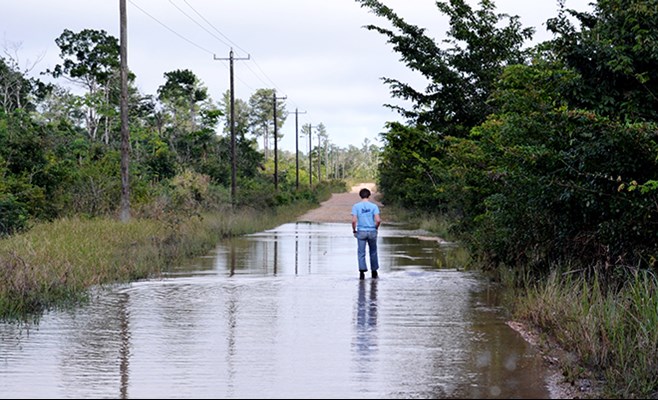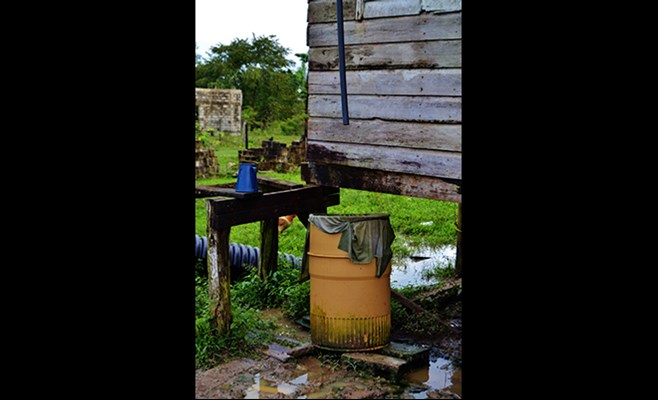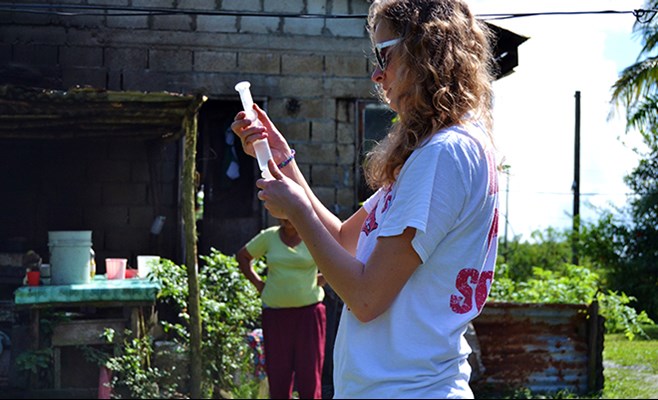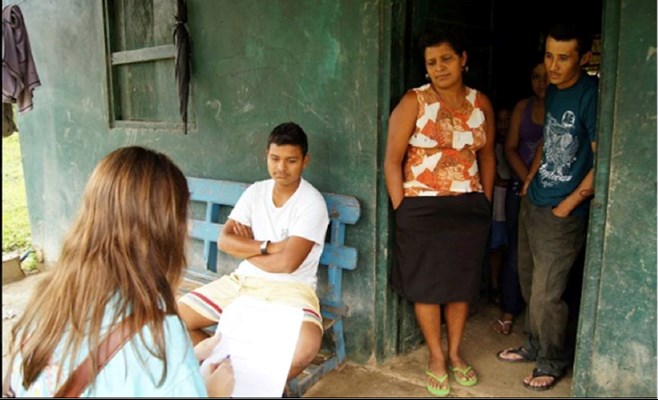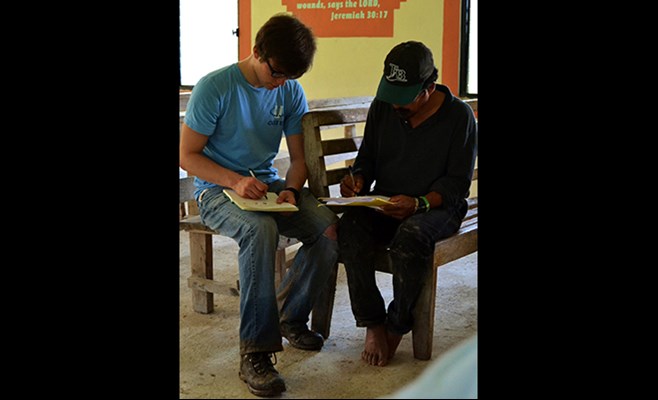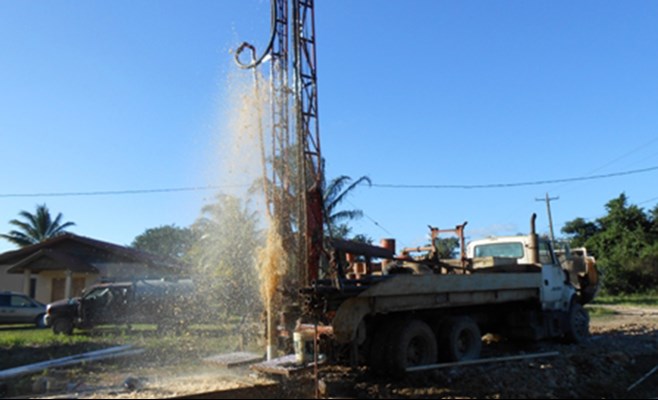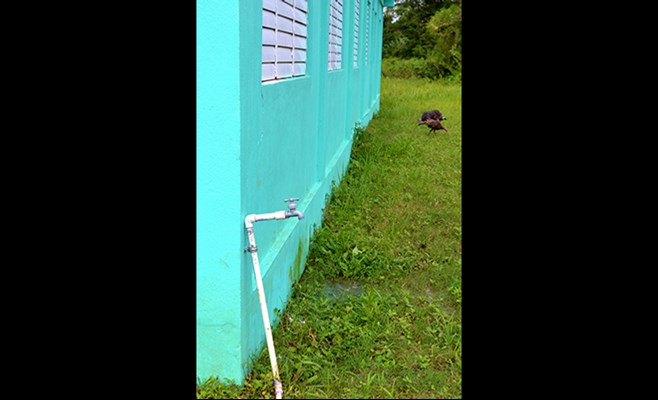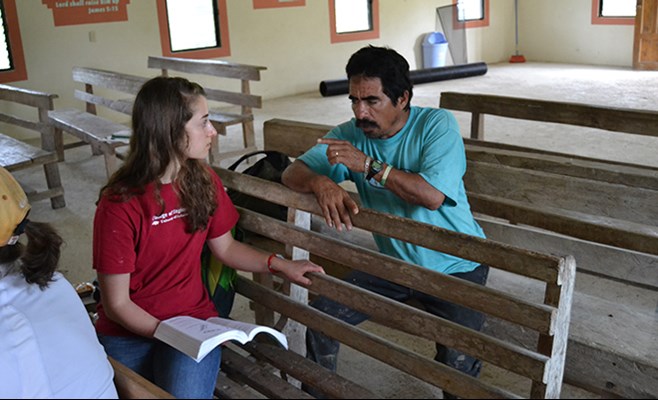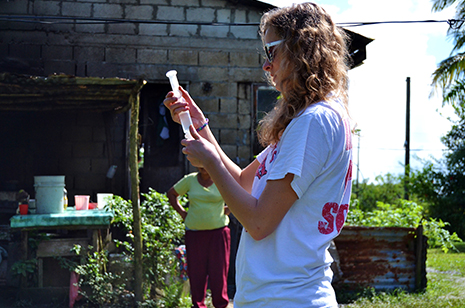
FAYETTEVILLE, Ark. – The University of Arkansas student group, Arkansas Engineers Abroad, is working toward a brighter future for the town of More Tomorrow in Belize, where villagers are sickened by too much water – and sometimes, not enough. Eight students from the group, six of them members of the U of A Honors College, traveled to More Tomorrow in early January to continue work on a project they began three years ago.
[For more information and photographs from the trip, visit Shelby Gill’s photo essay “Arkansas Engineers Abroad: Surveying More Tomorrow.”]
Currently the people of More Tomorrow collect water from a nearby river, shallow wells, and crude rainwater catchment systems such as rusted barrels, uncovered buckets, and tanks.
“The villagers are concerned that their rainwater has been contaminated by aerial pesticide sprayings carried out by local farmers,” said Kimberly Cribbs, an honors chemical engineering junior who serves as president of Arkansas Engineers Abroad. “And in the rainy season, the shallow-aquifer wells get infiltrated by run off from the local cow pastures. In the past, these wells have tested positive for fecal coliforms, E. Coli. and Staph.”
The students are already well along on an effort to provide a reliable source of clean water for More Tomorrow: they have built the foundation, installed piping and drilled a deep-aquifer well. They have also contracted for the design and construction of a 30-foot-tall water tower with a 2,500-gallon tank that will sit on top of the well, to be completed this spring. Once the water tower is complete, the people of More Tomorrow will be able to draw clean drinking water from a spigot attached to the tank and from another spigot at the local elementary school, thanks to piping installed on an earlier trip.
On this latest trip, their fifth to More Tomorrow, the students’ goal was to perform door-to-door health surveys and take water samples.
“These surveys are necessary to create a baseline of the community’s health prior to implementation of the water tower,” Cribbs said.
The students partnered with community leaders to survey 19 of the 23 families living in More Tomorrow. Community members reported that they suffered fever, hepatitis, diarrhea and fungal infections during the rainy season.
“And it’s not just due to the drinking water,” said Erin Cooper, an honors chemical engineering student, in a presentation at the weekly meeting of Arkansas Engineers Abroad. “There’s also standing water due to lack of drainage, which is a breeding ground for mosquitos. When the river floods, the latrines flood as well.”
In addition to surveying community members, the students met with Carol Babb, the deputy chief education officer of Belize’s Ministry of Education, and Nina Hernández, Peace Corps country director of Belize, who encouraged the students to create a project development plan. Peace Corps involvement in More Tomorrow has been limited up to now, due to safety concerns related to frequent flooding, but Hernández is considering sending a volunteer there on a regular basis after meeting with Arkansas Engineers Abroad.
“That was probably the crowning achievement of our trip, getting the Peace Corps involved,” Cooper said.
The students have raised $19,000 towards the $23,000 cost to build the water tower. They recently submitted a new proposal to the Clinton Global Initiative University, which has provided $2,860 in funding thus far, and hope to secure other grants and donations to complete the water tower. The College of Engineering and the students’ respective departments provided funding to support travel to and from Belize.
The students’ list of future projects is long, and growing longer. They plan to return to More Tomorrow in May to confirm that the water tower draws from a clean aquifer and to conduct a post-implementation survey. They also plan to work with the people of More Tomorrow to map and dig a drainage system and install composting latrines.
Michael Reinisch, an honors chemical engineering junior, is also dreaming up plans for sustainable energy: “With More Tomorrow, they could sustain themselves off the grid if they had a few solar panels installed. It’s possible we could use solar to sanitize water, too.”
Contacts
Kendall Curlee, director of communications
Honors College
479-575-2024,
Camilla Shumaker, director of science and research communications
University Relations
479-575-7422,
